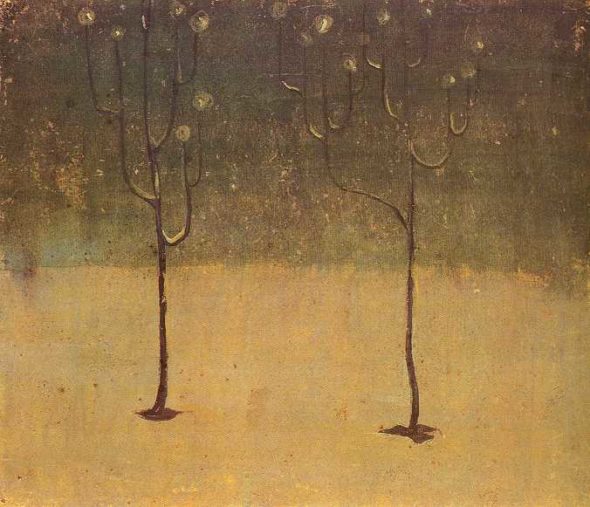

"Winter Motif," Mikalojus Konstantinas Ciurlionis, 1907. (Via Wikiart.org)
First Lines — JOY JOY JOY
- Published: January 10, 2020
I first encountered Jean Barlow Hudson’s poetry this summer. It was early July. A clear evening, warm not hot. A group of us sat after dinner in sculptor Jon Barlow Hudson’s studio/garage with the big door open to evening light. To the north, the Whitehall fields were darkening. We read poems aloud. Jon gave me a copy of his mother’s book, “Foreverness,” and I opened at random to a poem titled “Repose of the Night.” Beneath the title the notation: “Yellow Springs, 1970s.”
Every line spoke to our moment and mood. “Without, the summer night is calm and still, / except for the monotone of cricket call.” (In our case, someone joked, “except for the monotone of motorcycles on Fairfield Pike.”) “The night is vibrant and alive with happiness, / glad to be free of the harried day.” And finally: “I touch the cool air so quietly, / hoping to steal the magic of repose / that night has found.”
Time collapsed gently. Her moment and our moment met and fused. We were experiencing the “foreverness of time” she speaks of in another poem. Every moment so particular, so partial, but also eternal and whole.
The joining-up of words and worlds is the magic of poetry, and the magic of this poet’s poetry. Jean Barlow Hudson lived for years in Yellow Springs (she was our first female mayor), and died here in 1992. She is buried with her husband in Glen Forest Cemetery. She was a community activist, feminist, world traveler and writer — published as a novelist, unpublished as a poet. Her children collected her poems in a volume (the book Jon gave me, edited by her son Rex) after her death.
I have been living inside “Foreverness” since July, and have been looking forward to sharing an excerpt of the book’s long last poem — one of the last she wrote. “Dreams of the Winter Solstice” bears the dateline “Yellow Springs, 1992.” The excerpt I’ve chosen opens with an eruption — or irruption, a breaking-in — of joy.
Dream of the Winter Solstice (excerpt)
And lights exploded in the sky — violet, crimson, blue,
and there follows a sound so big
instinctively I recoil and hold my ears.
I look to the sky again expecting bonfires there,
but see instead three letters spread from side to side:
JOY JOY JOY
and something wild and beautiful and strong grabs me
and flings me into the sky
where I whirl across trees and towers and fields,
feeling only the strong surge of wind
and power caressing my bare face.
We — the wind, the sky, and I — dance a lusty dance,
macabre, and the sound of
JOY JOY JOY
reverberates like a drumbeat.
I am back again at my alley post and try to still
the veins that move with low content….
and beat the heart with sluggish joy.
Our body’s fetid mentoring of age and soil….
And he who sleeps beneath the oleander bush
may never ever wake again.
The plinth of sound of a small fish
cutting the water’s edge and disappearing again.
—Jean Barlow Hudson
This poem, and many of Jean’s poems, remind me of the great Russian poet Anna Akhmatova. I love the emotional intensity of both poets, their openness to sensory experience, their many astonishing images that light up their poems like — well, like JOY JOY JOY. This is how I experience Jean’s poem: as the flash, as the fading, as the afterimage of joy.
I’m especially drawn to her two closing stanzas. The poem would be marvelous without them, but with them, it enters a deeper level of being. A foreverness, perhaps. The stanzas are strange, aren’t they? They don’t really connect to what came before, and the images they offer are, to me, both appealing and unsettling.
“And he who sleeps beneath the oleander bush / may never ever wake again.” The oleander, I find when I look it up, is a beautiful flowering bush whose every part is toxic. So. These lines from Jean sound a bit like a warning, or a prophecy, or a cryptic moral. I can’t decide. But I feel a sense of sorrow and acceptance. Life grows with death. Life-death is beautiful, fatal. We all sleep beneath the oleander bush, no?
The last stanza turns the mood again. “The plinth of sound of a small fish / cutting the water’s edge and disappearing again.” I’m captivated by this image: the plinth of sound (a plinth being a heavy base). A heavy base, a small fish. So much of life is beneath or deep inside us, supporting but also “disappearing” us. We cut the water. We vanish. Jean’s lines have the mysterious wisdom of a Zen koan, something you come to understand not by thinking it through, but by pressing into the darkness of unknowing.
And that’s where the poem puts us. That’s where the year puts us. Solstice, the time of widest darkness — the heavy base of the year. Here, in the dark, I’m casting back to the “magic of repose.” I’m finding in that earlier poem a sense of contentment and longing, both. Longing-contentment. Life is not simple. The pain is there with the JOY JOY JOY. We’re asked only to live it, all and to the end.
*This column originally appeared in the Dec. 19 issue of the News. To read other First Lines poetry columns, visit the archive page here.
The Yellow Springs News encourages respectful discussion of this article.
You must login to post a comment.
Don't have a login? Register for a free YSNews.com account.










No comments yet for this article.